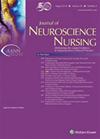住院成人神经学评估白皮书的撰写。
IF 2
3区 医学
Q4 CLINICAL NEUROLOGY
引用次数: 0
摘要
本文章由计算机程序翻译,如有差异,请以英文原文为准。
Development of a White Paper on the Neurological Assessment of the Hospitalized Adult.
R ELEC IO N S A ll hospitalized adult patients have the potential to experience a neurological event. It is important for nurses caring for those patients to be familiar with basic neurological assessment so subtle changes can be detected early, allowing prompt intervention to prevent further decline or irreversible damage. Nurses do not need an order to assess their patients' health status, because they are educated in the science of nursing assessment and required by state law to maintain competence. However, some nurses perceive the adult neurological examination as challenging because there is no established standard, leading to confusion and a piecemeal approach. The American Association of Neuroscience Nurses (AANN) Board of Directors recognized the importance of developing a standard neurological assessment for adult hospitalized patients that nurses from all specialties can use. They charged the Clinical Science Committee with the task of developing a white paper to describe essential components of the examination so nurses could identify early changes and intervene. It was not intended to be a detailed assessment for all neurological conditions; it was meant to describe a basic neurological assessment that can be used on any hospitalized adult, whether they have a neurological diagnosis. Working with the Clinical Science Committee, a task force of 6 experienced neuroscience nurses developed a white paper describing the essential components of a neurological assessment of the hospitalized adult. Awhite paper communicates the recommendations of an organization on a topic, which helps educate readers about an issue of interest, a good fit for the task. A clinical practice guideline was considered; however, after a review of the literature, there was not enough evidence to support and meet clinical practice guideline recommendations for the document.
求助全文
通过发布文献求助,成功后即可免费获取论文全文。
去求助
来源期刊

Journal of Neuroscience Nursing
CLINICAL NEUROLOGY-NURSING
CiteScore
3.10
自引率
30.40%
发文量
110
审稿时长
>12 weeks
期刊介绍:
The Journal of Neuroscience Nursing (JNN), the official journal of the American Association of Neuroscience Nurses, contains original articles on advances in neurosurgical and neurological techniques as they affect nursing care, theory and research, as well as commentary on the roles of the neuroscience nurse in the health care team.
The journal provides information to nurses and health care professionals working in diverse areas of neuroscience patient care such as multi-specialty and neuroscience intensive care units, general neuroscience units, combination units (neuro/ortho, neuromuscular/rehabilitation, neuropsychiatry, neurogerontology), rehabilitation units, medical-surgical units, pediatric units, emergency and trauma departments, and surgery. The information is applicable to professionals working in clinical, research, administrative, and educational settings.
 求助内容:
求助内容: 应助结果提醒方式:
应助结果提醒方式:


